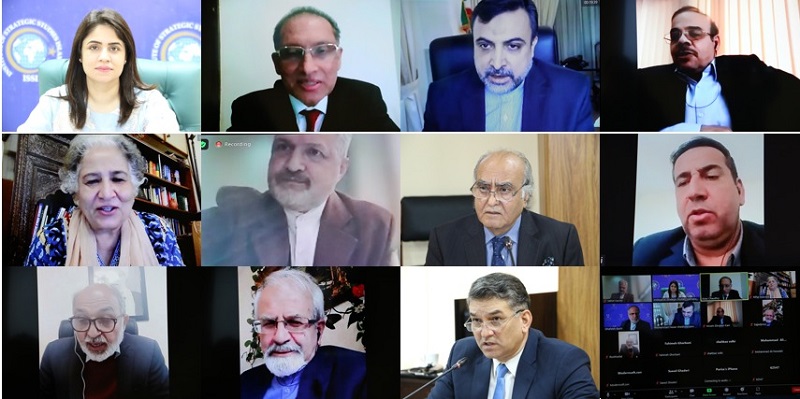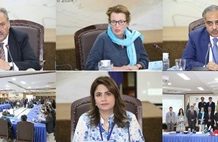PRESS RELEASE
Institute of Strategic Studies Islamabad & Institute for Political and
International Studies
Bilateral Dialogue
October 12, 2021

The Institute of Strategic Studies Islamabad and Institute for Political and International Studies, Iran held their Annual Dialogue on bilateral and regional issues. The dialogue was divided into three sessions. The distinguished speakers included Dr. Hossein Ebrahim Khani, Senior Research Fellow, IPIS; Ambassador Riffat Masood, Former Ambassador of Pakistan to Iran; Dr. Saeed Ghaderi, Senior Research Fellow, IPIS; Ms. Amina Khan, Director, Center for Afghanistan, Middle East and Africa (CAMEA), ISSI; Dr. Mohsen Roohisefat, Senior Research Fellow, IPIS and Dr. Talat Shabbir, Director China Pakistan Study Center (CPSC), ISSI, and was moderated by Ms. Amina Khan, Director CAMEA.
During his welcome remarks, Ambassador Aizaz Ahmad Chaudhry, Director General ISSI said that Pakistan and Iran share close cultural and religious ties and have always resolved any bilateral issues in a conducive environment. He also said that there is a mutual benefit in coordinating with each other since events in Afghanistan have a direct impact on both the countries.
Dr. Mohammad Hassan Sheikholeslami, President, IPIS stated that there is a greater need for global concerted efforts to promote multiculturalism. Pakistan and Iran share a common regional destiny. The contemporary situation in Afghanistan is very concerning especially with regard to terrorist activities. He also pointed to how ‘Zionist’ attempts had created instability in the Persian Gulf region and that all regional states should work closely together to create a new security architecture. He also said that by working closely together, both Iran and Pakistan can champion shared goals and help counter any regional instability.
The first session was titled Pakistan-Iran bilateral relations and was moderated by Dr. Majid Ghafelebashi,Vice-President for Research, IPIS.
Ambassador Hossein Ebrahim Khani gave a brief overview of the history of Pakistan-Iran relations and said that with the arrival of the new Taliban establishment in Afghanistan, there is a changed atmosphere in the region. He hoped this would pave the way for Pakistan to enter into closer cooperation and collaboration with Iran, and to revive existing arrangements as well as find new vistas especially in terms of trade to boost the economies of both countries.
Ambassador Riffat Masood while expressing her views said that now is the time for Iran and Pakistan to look beyond traditional rivalries and problems. She highlighted how the region is undergoing a major geostrategic shift and that regional countries should come together and work towards a peaceful stable Afghanistan. She said one area where both Pakistan and Iran have been negligent is on the economic front. As bordering countries both Pak-Iran economies naturally complement each other. Hence, we have to work towards finding ways to overcome these challenges. She also highlighted how both countries should work towards making the border safer- especially for the religious pilgrims- in the background of the Covid pandemic.
The second session was on the Situation in Afghanistan and was moderated by Ambassador Khalid Mahmood , Chairman ISSI.
Dr. Saeed Ghaderi said that the Taliban are a reality in Afghanistan. Two decades of US presence in Afghanistan has created a crevice between the opinions of the Afghan public and the Taliban. The group also needs to give assurances that Afghan soil will not be used to target regional countries because there is a real threat that there may be revival of terrorist threats. He went on to highlight that Afghanistan is a vulnerable point for the entire region which the US can exploit and misuse. He concluded by underlining the importance of provision of international aid to Afghanistan without any preconditions attached. Legitimacy of the Taliban will depend on how they face current challenges.
Ms. Amina Khan stated that with the US exit and in the absence of a negotiated settlement, takeover by the Taliban was expected though the manner and the speed at which the group had taken over the country was certainly not anticipated. While no country has recognized the group, the international community has been engaging with the group through Doha, while the regional countries have been directly interacting with the group – therefore the group has attained de facto recognition. With an interim government, the real test for the Taliban has only just began – which is certainly not limited to the capture of power, but is more about legitimacy, recognition, acceptance, and performance, in terms of governance, foreign relations, human rights and more importantly CT assurances, ensuring that Afghanistan does not become a safe haven for transnational terrorist groups for the region and larger global community.
The third session was on Regional Connectivity and was moderated by Dr. Majid Ghafelebashi.
Dr. Mohsen Roohisefa said a lot of regional connectivity depends upon how well regional countries work together. A neighbourhood policy is obligatory for both Iran and Pakistan. Hence, the MoUs signed between the two sides should be implemented. There also needs to be an effective trade policy in place to counter sanctions on Iran. There is a lot of opportunity for energy connectivity in this regard. He also pointed to how the new government in Iran paves way for enhanced regional connectivity which he said is premised on good bilateral relations between Iran and Pakistan. He also said that the shadow of terrorism needs to be abolosihed if any economic activity is to succeed in the region. Joint research is needed in this regard and would be beneficial for all, he concluded.
Dr. Talat Shabbir said that rapid transportation and easy communication are key for promoting regional connectivity which in turn is linked to peace. This is why stability in Afghanistan is key to establishing connectivity with the resource rich Central Asian States, he said. He also highlighted how Pakistan has changed its focus from geopolitics to geoeconomics and so more opportunities between Pakistan and Iran in this regard have opened up. He also said that the proposed Pakistan-Iran Free Trade Agreement (FTA) is likely to bolster effective banking channels, establishment of markets along the border, elimination of illegal trade and exchange of business delegations.
During his concluding remarks, Ambassador Aizaz stated that a lot depends upon what will happen in Afghanistan. On regional connectivity the sentiment is positive and the potential between Pakistan and Iran is huge and must be released soon.
Dr. Seyed Kazem Sajjadpour, former President, IPIS while making his concluding remarks said that for bilateral relationship to proceed principles are needed to be in place. Though there is a lot of potential between Iran and Pakistan the practice to realise this is lacking on both sides. Player and partnership is important especially in light of events in Afghanistan and the Persian Gulf. He also said that we see western powers gradually receding from the region, which means regional players have more space to formulate conducive partnerships towards shaping a new region which will benefit everyone.











